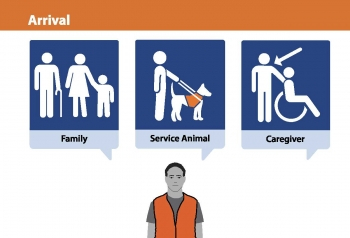NCCDD and NCEM Release Communications Tool for Emergency Shelters
Weather events, in general, make it clear that not only residents, but emergency first responders, shelters and other service providers should have better communications tools for proper care and attention to various communities across the State – such as the disability community.
In a longstanding partnership, North Carolina Council on Developmental Disabilities (NCCDD) and the North Carolina Emergency Management (NCEM) have worked together to create communications materials and resources that assist emergency responders and shelters to better help people with disabilities in emergency situations.
Most recently, NCCDD and NCEM released Show Me: A Communication Tool for Emergency Shelters. The book was co-created by public health professionals and populations it is meant to serve to help emergency shelter personnel effectively communicate with and assist people with cognitive disabilities, people who are deaf, have limited English proficiency – among others – in emergency situations. 
Designed as a "point-and-show me" tool, the Show Me booklet uses simple graphic icons to overcome communication barriers and help people in distress explain their needs and concerns with professional community shelter staff and volunteers. It can also be used by emergency medical technicians (EMT), first responders and other emergency service providers as the booklet covers topics like medical needs, food allergies and more.
"Emergency preparedness is very important to people with disabilities who face mobility, visual impairment and other issues," Chris Egan, executive director of NCCDD, said. "To help emergency responders better assist the disability community, the Council and NCEM have been working together to provide communications tools so people with intellectual and developmental disabilities, their families and caregivers can better explain their needs and receive proper support during times of emergency."
In 2014, the NCCDD and NCEM also created the North Carolina Emergency Preparedness Initiative Blueprint, a plan for community emergency preparedness focusing on the disability community.
"Good communication is critical at all times and especially during emergencies," said state Emergency Management Director Mike Sprayberry. "Whether you use the mobile application or the physical book, the 'Show Me' tool can help first responders and shelter providers better communicate with those who have cognitive disabilities or language barriers."
The Show Me booklet will be available for download on ReadyNC's website in the near future, and is also available as a mobile app in the iTunes or Google Play store.
"Our goal is to help ensure that all North Carolinians are better prepared for disasters and emergencies," said Sprayberry.
The original Show Me booklet was produced by the Massachusetts Office of Preparedness and Emergency Management. NCEM and NCDDD requested and obtained permission for reprinting.
To learn more about the North Carolina Council on Developmental Disabilities, contact NCCDD Systems Change Manager Shayna Simpson-Hall at [email protected]
To learn more about the North Carolina Emergency Management and Show Me: A Communication Tool for Emergency Shelters, contact NCEM Program Manager Abby Cameron at [email protected].